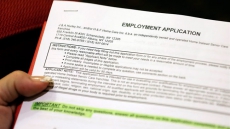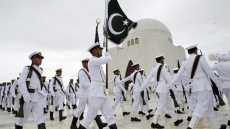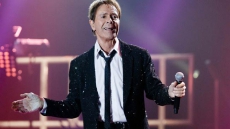WASHINGTON - The first time Barack Obama touched a racially heated debate during his presidency, he wound up getting scorched.
In his first year in office, America's first black president saw his approval ratings fall precipitously in mere days, dropping seven percentage points among white voters, according to a Pew survey from July 2009.
That was the week he criticized the arrest of a Harvard professor in his own home after police suspected him of breaking in. Obama wound up inviting both Henry Louis Gates and the officer who arrested him for a beer at the White House.
But the damage was done.
It's a pattern that's repeated itself several times during Obama's career — with even the rarest, most timid incursion into the choppy waters of racial politics leaving him waist-deep in political waves.
On Thursday, he tiptoed back in following a fourth straight night of violent clashes between police officers and protesters in the Missouri community of Ferguson, the result of the police shooting of an unarmed black teen.
Obama's public appearance came after the White House was subjected to a torrent of ridicule in social media the previous night, having tweeted about a delightful evening on Martha's Vineyard at the birthday of a lobbyist's wife as suburban St. Louis spiralled into scenes of smoke-filled bedlam.
Obama said there was no excuse for police misbehaviour — the excessive force, unwarranted arrests, the detention of journalists, or investigative cover-ups.
On the other hand, he cautioned, there was no excuse for reports of vandalism, looting, or violence against police.
"So now is the time for healing," he said.
"Now is the time for peace and calm on the streets of Ferguson. Now is the time for an open and transparent process to see that justice is done. And I’ve asked that the attorney general and the U.S. attorney on the scene continue to work with local officials to move that process forward."
He never once mentioned the words, "black," or "race," or "African-American."
Compare that to Rand Paul, the white Kentuckian Republican expected to run for president in 2016. In an open letter Thursday, the senator ripped the militarization of American police forces, which he blamed on big government. And he said anyone who thinks race doesn't play a role in how justice gets applied in the United States just isn't paying attention.
Like Paul, the current president has talked about how African-Americans are statistically much more likely to be sent to prison for committing the same crime as whites. He's even reduced the huge gap in penalties between possession of crack and powder cocaine.
But Obama doesn't discuss race all that often.
In fact, after sifting reams of presidential statements and executive orders, Daniel Gillion, a researcher at the University of Pennsylvania, concluded Obama has publicly mentioned race less often than any Democratic president since at least 1961.
When he does, it's generally along Thursday's lines: voice frustrations felt by the black community, add a caveat, call for national healing.
It was similar following the not-guilty verdict for George Zimmerman, who shot and killed another unarmed black teen, Trayvon Martin.
Obama spoke about his personal experiences growing up as a black man — being followed in department stores, hearing car doors lock as he walked by, seeing a woman clutch her purse in the elevator.
Then came the caveat. Obama said African-Americans weren't naive about the fact that young black men were "disproportionately involved in the criminal justice system... (and were) disproportionately both victims and perpetrators of violence."
One polemicist points to the Martin-Zimmerman case to illustrate a gloomy point about Obama's presidency.
Forget the post-racial healing people spoke of when Obama was first elected — Ta-Nehisi Coates suggests in a 2012 essay that, on the contrary, Obama's time in office has exposed and even deepened ugly wounds.
As evidence, he pointed to the initial reaction to Martin's shooting as apolitical. He said it was recognized as a tragedy by liberals and conservatives, whites and blacks alike — until Obama touched it.
The instant Obama weighed in with his relatively tepid remarks, "this could've been my son," the death became fodder for political debate, Coates wrote in the essay, published in the Atlantic.
"In a democracy, so the saying goes, the people get the government they deserve," he wrote.
"Part of Obama's genius is a remarkable ability to soothe race consciousness among whites. Any black person who’s worked in the professional world is well acquainted with this trick. But never has it been practised at such a high level, and never have its limits been so obviously exposed."
Coates said the opposition to Obama is fuelled, in part, by politicized rage. There's a fair bit of political-science research that suggests racial attitudes spur at least some of the opposition to the president.
"But the rules of our racial politics," he wrote, "require that Obama never respond in like fashion."





